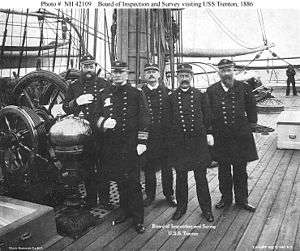James Edward Jouett
Rear Admiral James Edward Jouett (7 February 1826 – 30 September 1902), known as "Fighting Jim Jouett of the American Navy",[1] was an officer in the United States Navy during the Mexican–American War and the American Civil War. His father was Matthew Harris Jouett, a notable painter, and his grandfather was Revolutionary War hero Jack Jouett.
James Edward Jouett | |
|---|---|
| Born | February 7, 1826 near Lexington, Kentucky |
| Died | September 30, 1902 (aged 76) Sandy Spring, Maryland |
| Place of burial | Arlington National Cemetery |
| Allegiance | |
| Service/ | |
| Years of service | 1841–1890 |
| Rank | |
| Unit | USS Metacomet North Atlantic Squadron 1889 Panama action |
| Battles/wars | Mexican–American War American Civil War |

Biography
Born near Lexington, Kentucky, Jouett was appointed Midshipman 10 September 1841. He served on the African coast on the Decatur with Matthew C. Perry and on the John Adams during the Mexican–American War.
American Civil War
At the beginning of the Civil War, Jouett was captured by Confederates at Pensacola, Florida but was soon paroled. He then joined the blockading forces off Galveston, Texas, distinguishing himself during the night of 7/8 November 1861 in the capture and destruction of Confederate schooner Royal Yacht, while serving on USS Santee. Jouett later commanded the Montgomery and R. R. Cuyler on blockading duty and in September 1863 took command of the Metacomet.
In the Battle of Mobile Bay, 5 August 1864, his ship, the Metacomet, was lashed to Admiral David Farragut's flagship Hartford as the ships entered the bay. Monitor Tecumseh was sunk by an underwater "torpedo", but the ships steamed on, inspired by Farragut's famous command: "Damn the torpedoes! Four bells! Captain Drayton go ahead! Jouett full speed!" Metacomet was sent after two Confederate gunboats, and in a short chase Jouett riddled the Gaines and captured the Selma.
Post-Civil War and last years
Jouett had various commands ashore and afloat after the Civil War, taking command of the North Atlantic Squadron in 1884. In 1885 he commanded a naval force which forced the opening of the isthmus of Panama, threatened by insurrection.
Shore duty
Admiral Jouett was named President of the Board of Inspection and Survey and served from June 1886 to February 1890.
Retirement
Rear Admiral Jouett retired in 1890. A special act of Congress granted him full pay for the rest of his life as a reward for his brilliant service.[1] He returned to his home "Stockwood" in Howard County, Maryland[2] he lived most of his remaining years at "The Anchorage," Sandy Spring, Maryland. He was buried at Arlington National Cemetery section 1, site 85A.
Honored in ship naming
Three ships in the United States Navy have been named USS Jouett in his honor.
References
- This article incorporates text from the public domain Dictionary of American Naval Fighting Ships. The entry can be found here.
- "Rear Admiral Jouett Dead" (PDF). New York Times. 1902-10-02. Retrieved 2010-01-04.
- "Naval Items". The Ellicott City Times. 31 March 1877.
| Military offices | ||
|---|---|---|
| Preceded by Stephen B. Luce |
Commander-in-Chief, North Atlantic Squadron 20 September 1884 – June 1886 |
Succeeded by Stephen B. Luce |